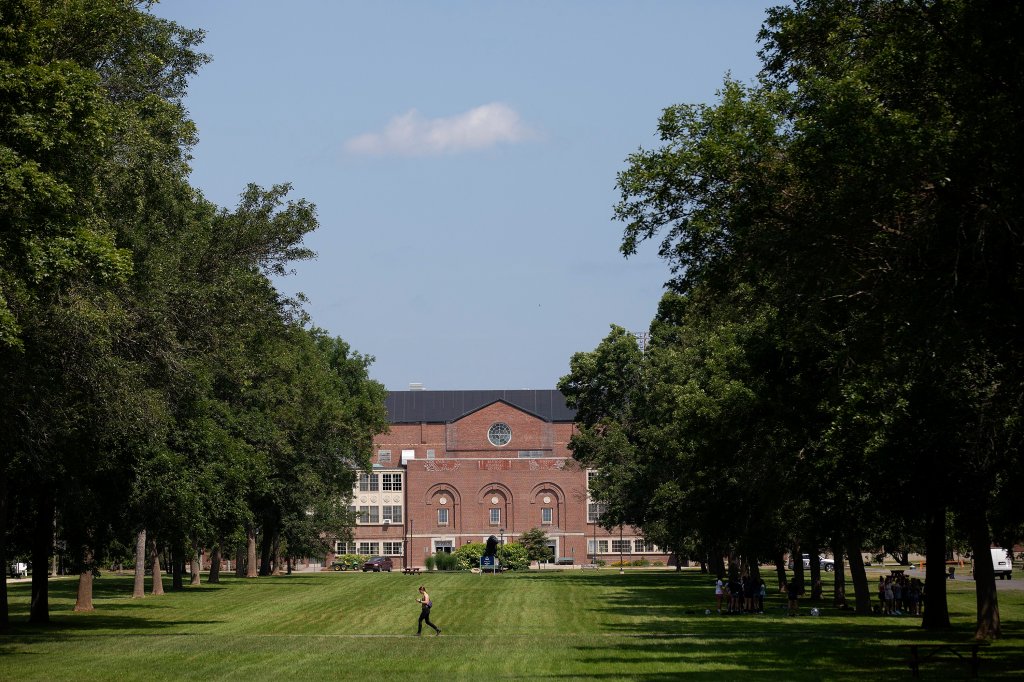
Graduate student workers at Maine’s public universities are rallying to advocate for a union contract that includes better pay and health care. The Friday event at the flagship university in Orono comes almost two years after the bargaining process began.
“The goal of our negotiations at this point is to get the University of Maine System to take our proposal seriously,” said Peter Howe, a third year doctoral student in the School of Forestry Resources at UMaine, and a research assistant. He’s also a member of the union’s bargaining committee.
The University of Maine Graduate Workers Union, which represents student workers across all schools in the state’s public university system, went public with its campaign in March 2023 and began bargaining that November.
The union’s goals for a contract include higher wages, better health care, housing access and other benefits. They have reached agreements with the system on several matters, but many others remain under discussion.
Organizers have consistently decried the length of the negotiation process, which is approaching 700 days. The average time it takes a union to sign its first contract is 465 days, according to a 2022 analysis from Bloomberg Law.
Braden Beard, a labor and employment attorney at the Maine firm Johnson & Webbert, said new union members are often surprised that a first contract can take as long as a year, but he said two years is an exceptionally long time.
Samantha Warren, a spokesperson for the system, said the institution values the contributions of graduate workers, continues to bargain in good faith and remains, “committed to achieving an agreement that is responsive to the requests of these student workers and the operational needs and increasingly constrained resources of our public institutions.”
She said the system’s ability to improve work conditions “without shifting costs to our students and their families in the form of unreasonable tuition increases” depends on state and federal funding, which have been impacted in recent months.
But union organizers say their concerns predate those impacts.
Maine graduate students make less than their peers at public university systems in Vermont, New Hampshire and Rhode Island, and pay more in health care premiums, the union says. Workers getting a master’s degree currently make a minimum $17,000 stipend, while that number is $20,000 for PhD students.
Warren said those stipends are for 20 hours a week of work during a nine-month period. The university also provides health benefits and waived tuition for many of those students.
In their latest bargaining session, the union reported, the system agreed to increase the minimum stipends — $20,000 for master’s students and $23,000 for PhDs — which organizers still say is still “too little to live on” and only would apply to UMaine in Orono, not the other universities. The two parties also reached agreements on housing and tax assistance, the union said, but not on health care.
Organizers argue that graduate student workers are essential to staffing the research, teaching and administrative work that happens at the state’s public universities. Howe said UMaine’s pay compared to peer institutions makes it less competitive as a research university.
“We see an investment in grad workers here as an investment in the university and an investment in the state, and that’s what we really need the president and the chancellor to understand,” he said.
Howe said he and his fellow workers love their jobs and want to be there, but can only do so if they’re materially supported.
The rally will get a high-profile political boost from three Democratic candidates: Graham Platner, the oyster-farming former Marine and U.S. Senate candidate who has drawn crowds with his working-class messages; Jordan Wood, a Lewiston native and campaign finance reform advocate also running to unseat Susan Collins; and Troy Jackson, the logger and longtime Maine legislator who is running for governor. Several state legislators are also scheduled to be in attendance.
“We really feel like the whole state is watching,” Howe said.

We invite you to add your comments. We encourage a thoughtful exchange of ideas and information on this website. By joining the conversation, you are agreeing to our commenting policy and terms of use. More information is found on our FAQs. You can modify your screen name here.
Comments are managed by our staff during regular business hours Monday through Friday as well as limited hours on Saturday and Sunday. Comments held for moderation outside of those hours may take longer to approve.
Join the Conversation
Please sign into your CentralMaine.com account to participate in conversations below. If you do not have an account, you can register or subscribe. Questions? Please see our FAQs.